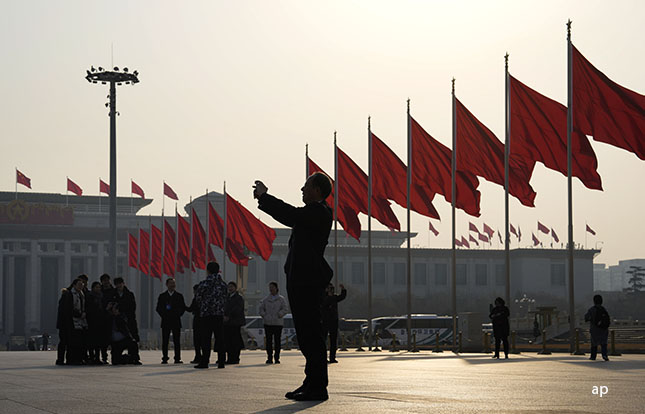Christopher Johnson: Welcome to Morningstar U.K. My name is Christopher Johnson. Today I'm joined by Sandy Pei, Deputy Portfolio Manager of the Federated Hermes Asia ex-Japan Fund.
Sandy, thank you so much for being here with me. So, you've just returned from a trip to China, and I wanted to get your view on what your outlook for the Chinese economy and is it as stark as things seem?
Sandy Pei: So, on the ground, the sentiment is pretty pessimistic. But that's not necessarily a bad thing because through our investment history, we often find the real bottom happened at when the management of the company become very pessimistic, and valuation is already reflecting a pretty bad scenario. I think the consensus view for Chinese macro is gloomy. We are indeed facing a number of the challenges but also in the way of translating into a new growth, a different kind of growth-driven economy. We can get into the details later. But I'd say yes, things do look challenging, and you feel that on the ground. But sequentially, you also see sense of improvement.
Johnson: What are those challenges and what do you think are the solutions to kind of accelerate that new growth strategy that you're referring to?
Pei: So, property is an area that everyone is focused on. It is important not just because the direct and indirect exposure to the public sector is big, but also, it gives a sense of wealth for Chinese. One of the biggest problems for the economy now is consumption. Theoretically, it should be strong because you see household income is increasing. Chinese do have much higher saving rates compared to many other major economies and you have a growing middle class. So, there's a lots of theoretical reason for strong consumption, but in reality, that didn't happen last year. And the reason is not because people don't have money but rather the consumer confidence is weak, and the property plays a role into that. If you look at household portfolio, apart from the savings, a big part is property. So, when people think their property value is going down, that also affects sentiment. So, the willingness to spend is weak rather than the ability to spend.
Johnson: What do you think the impact is of the likely liquidation of Evergrande, the property giant that is very indebted?
Pei: So, Evergrande is a big company, and it is important. However, it is one of the big developers in China. The market is actually very, very fragmented and Evergrande issue, apart from some other names, well highlighted and there's no complete solution yet but the impact has already been felt in the economy. Certain projects have been taken over. So, if you're familiar with the Chinese property market, most developers do pre-sell, meaning they are selling a piece of contracts to consumers who will get the delivery of the project in about three years' time later. So, there's time lag between when they started selling and when they actually deliver the projects. So now the biggest issue is how to ensure the completion and the delivery of those pre-sold contracts.
Another issue for Evergrande is you know the founder has been arrested. That gives the signal to other private developer or founder that they need to do everything potentially including using their personal wealth to be responsible, because they got the company over-leveraged and they're not doing a good job to their creditors and to their consumers.
Johnson: Do you see there being opportunity despite this very gloomy outlook on China property? There is still opportunity for investors in China within this sector.
Pei: The property sector is very interesting, but if you're an investor that now facing constraint, it may be better to consider a bond of those developers rather than equity because you get paid earlier and that you payoff, your risk-reward is very attractive now or more attractive than equity owners.
Johnson: According to Morningstar data there, Federated Hermes Asia ex-Japan Fund that you are the Deputy Portfolio Manager of, it lost minus 2.64% although it did beat the Morningstar index. So, what do you think is the driver for the underperformance. And is China the main culprit of this?
Pei: So last year, we had a very strong alpha from the stock selection, about 5.3%. But we lost alpha from asset allocation, mainly due to underweight, significant underweight of India and underweight of Taiwan, an overweight of China. So, China's challenges are well highlighted. However, last year, the Chinese market did deliver decent earnings. The market itself just got further derated.
Johnson: Still staying on the topic of China, we have been quite pessimistic on the outlook in this discussion. But what is getting you excited? What sectors or stocks within China that you invest in, are you excited to see hopefully do well this year?
Pei: We have a number of Chinese state-owned enterprises. Historically, Chinese SOE has been trading at substantial discount to private companies because they are not that shareholder-friendly, and they often sit on very lazy balance sheet and management are not incentivized to improve returns. But things have changed. About more than a year ago, the central government said, change the KPI for SOE management. Things like cash flow, ROE have been included in management KPI. So, you actually see some of those SOEs have increased payout. Some of them even started buying their own shares from the market. So, there's clear improvement.
We like travel stocks. So, as discussed earlier, the Chinese household do have money but no confidence. So, they are no longer spending on everything. However, they are spending in selected areas, experience related. Tavel is one of the areas they are definitely spending on. You see all of the data give a strong growth of the sector. In fact, the domestic travel has already surpassed 2019 level, and there's no sign of slowing down. People just love going out more, both young people and the retired people. And for outbound travel, that has been growing, but the speed of recovery has been affected by flight capacity and also the fact that Chinese do need a visa to go to most countries, and that has also been a bottleneck. However, the recovery is now back to 60% to 70% of 2019 level. And there's still big room for that to recover to 2019 level or get even higher. Because the penetration for outbound traveling is still very, very low in China. Not that many Chinese people have a passport. And when we talk about outbound, a big proportion of that is still going to Hong Kong Macau. So, there are so many other places for the Chinese to explore.
Johnson: Sandy, there's a lot of talk about the Japanification of China because of China's demographics, low growth. What do you say to that? Do you believe that China is getting old before it will get rich? What's your view?
Pei: The key difference between Japan before they got into the Japanification or like the last 20 years, the market was in bubble. But the Chinese market is already trading at historical low valuation comparing to the global equity. So, the starting point is very, very different. And if you look at Japan, certain sector companies still do very, very well in the past 20 years, company like Toyota. But why they did well despite the challenges Japan as a country was facing, because they had very strong balance sheet. So, there's no debt pressure, there's no overleverage before the crisis started, and they had globally competitive products. So, in China, there are companies that are not just competitive in China but are competitive or becoming competitive in global market. And we believe those companies will do well.
Johnson: Sandy, thank you so much for joining me here. This is Christopher Johnson from Morningstar U.K.





























